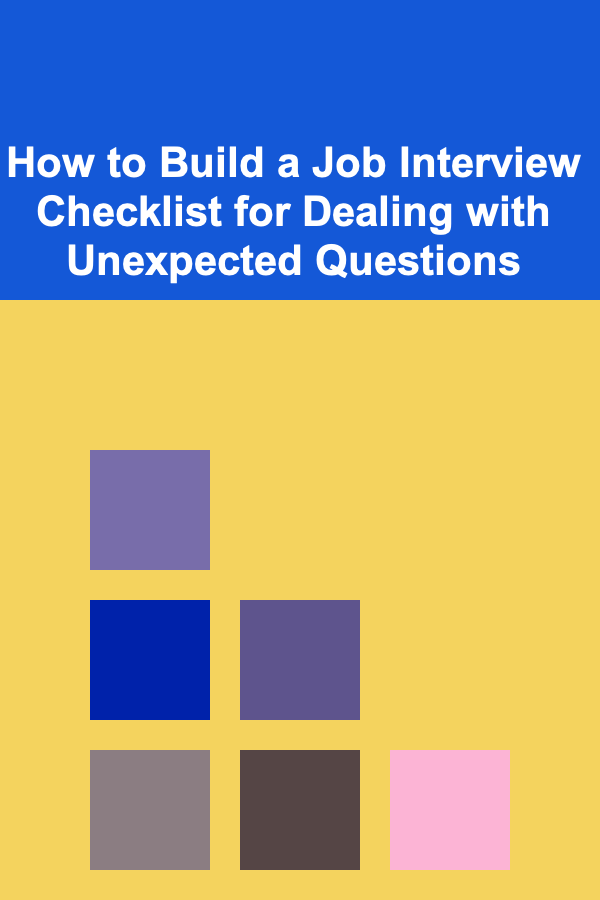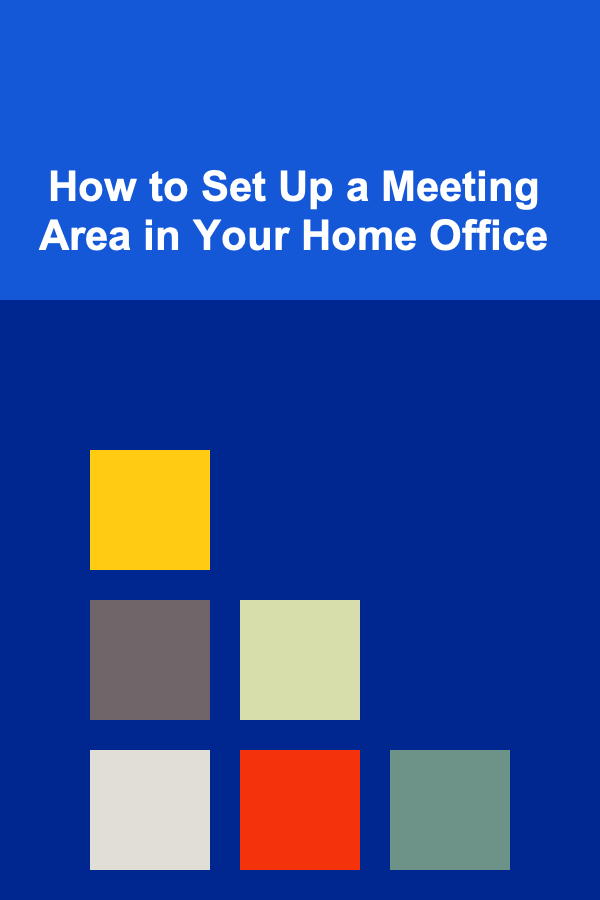
How to Build a Job Interview Checklist for Dealing with Unexpected Questions
ebook include PDF & Audio bundle (Micro Guide)
$12.99$11.99
Limited Time Offer! Order within the next:

Job interviews can be a nerve-wracking experience, especially when you face unexpected questions. While you can prepare for common interview questions, there are always a few curveballs thrown your way. These surprise questions are designed to test your ability to think on your feet, your creativity, and your problem-solving skills. Rather than being caught off guard, it's important to have a strategy for handling them.
In this actionable guide, we will walk you through the steps to build a comprehensive checklist that will help you deal with unexpected interview questions. This checklist will focus on key strategies, tips, and mindsets that will help you stay calm, think clearly, and provide thoughtful responses, even when the questions seem impossible to answer.
Prepare Yourself Mentally for the Unexpected
The first step in building your job interview checklist is to prepare yourself mentally for the unexpected. It's important to recognize that some questions may not have a "right" answer. The goal of these questions is often to see how you approach challenges, not necessarily to get a perfect response.
A. Shift Your Mindset
When faced with an unexpected question, remember that it's an opportunity to showcase your problem-solving skills and your ability to stay composed under pressure. Instead of focusing on the difficulty of the question, focus on how you can use it as a chance to demonstrate your critical thinking abilities.
B. Embrace the Silence
Many people feel compelled to answer immediately when faced with an unexpected question. However, it's completely acceptable to take a moment to gather your thoughts. Pausing before answering shows that you are reflective and deliberate in your responses.
Checklist Actionable Tip:
- Remind yourself that it's okay to take a few seconds to think about the question. This will help you calm your nerves and formulate a thoughtful response.
Understand the Intent Behind the Question
Unexpected questions often have a deeper purpose. Interviewers may ask these types of questions to evaluate your character, adaptability, or creativity. Understanding the intent behind the question will help you respond appropriately.
A. Assess the Type of Question
There are a few common types of unexpected questions that are frequently asked in interviews:
-
Behavioral questions: These assess your past experiences and how you handled certain situations.
- Example: "Tell me about a time when you had to handle a difficult customer."
-
Hypothetical questions: These explore how you might handle situations that haven't happened yet.
- Example: "If you were given a project with limited resources, how would you prioritize your tasks?"
-
Creative or abstract questions: These test your creativity, thought process, and ability to think outside the box.
- Example: "If you could have dinner with any historical figure, who would it be and why?"
-
Personality or culture fit questions: These assess whether you would be a good fit for the team or company culture.
- Example: "How would your best friend describe you?"
B. Analyze the Underlying Goals
Take a moment to reflect on what the interviewer may be trying to learn. Are they testing your emotional intelligence? Are they curious about how well you handle stress or ambiguity? Understanding the purpose of the question can guide your response.
Checklist Actionable Tip:
- When confronted with an unexpected question, quickly analyze whether it's behavioral, hypothetical, creative, or culture-related. This will help you choose the best way to structure your answer.
Follow a Simple Framework to Answer Effectively
One of the most important things to remember when dealing with unexpected questions is to structure your response clearly and logically. Having a framework in mind will help you organize your thoughts and deliver a more coherent answer.
A. The STAR Method
For behavioral questions, the STAR method is a powerful way to structure your answer:
- Situation: Briefly describe the context or background of the situation.
- Task: Explain the task or challenge you faced.
- Action: Discuss the actions you took to address the situation.
- Result: Share the outcome and what you learned.
B. The 3-Step Response Strategy
For other types of unexpected questions, you can use a simpler framework:
- Acknowledge the Question: Start by briefly summarizing the question to show that you understand what's being asked.
- Provide Your Answer: Offer a clear and concise response, drawing from your experiences or knowledge.
- Connect to the Job or Company: Tie your answer back to the role or company to demonstrate relevance and alignment with the position you're applying for.
Checklist Actionable Tip:
- Practice answering unexpected questions using the STAR method or the 3-step response strategy. This will help you stay on track and answer effectively, even when the questions catch you off guard.
Manage Your Nerves
Handling unexpected questions requires composure, and managing your nerves is a key part of staying calm and focused.
A. Control Your Breathing
Before answering an unexpected question, take a deep breath. Slow, deep breaths can help calm your mind and prevent anxiety from clouding your thinking.
B. Positive Visualization
Visualize yourself answering the question confidently and clearly. Positive visualization can help reduce anxiety and improve your performance.
C. Body Language
Your body language plays a crucial role in how you come across in an interview. Maintain good posture, make eye contact, and use hand gestures (if appropriate) to communicate confidence.
Checklist Actionable Tip:
- Before the interview, practice deep breathing exercises and positive visualization. Use these techniques when an unexpected question arises to stay calm and focused.
Practice Common Unexpected Questions
While you can't predict every question, there are a few that frequently pop up in interviews. Practice answering these types of questions to feel more confident when they arise.
A. Classic Curveball Questions
- "If you were an animal, what animal would you be and why?"
- "If you had unlimited resources, what project would you work on?"
- "What's your biggest weakness?"
- "What's your proudest accomplishment?"
B. Practice with a Friend or Mentor
To prepare for unexpected questions, role-play interview scenarios with a friend, mentor, or coach. This will help you get used to answering questions on the fly and will give you the chance to refine your responses.
Checklist Actionable Tip:
- Create a list of potential curveball questions and practice your responses with a friend or mentor. The more you practice, the more comfortable you'll be when these questions arise in an actual interview.
Keep Your Responses Authentic
It can be tempting to craft the "perfect" answer to every question, but authenticity is key. Employers appreciate genuine responses that reflect who you truly are, rather than scripted or overly rehearsed answers.
A. Be Honest About What You Don't Know
If you don't know the answer to a technical question or a hypothetical scenario, it's okay to admit it. The important thing is to show that you are open to learning and capable of problem-solving.
B. Use Personal Examples
When appropriate, tie your answers to personal experiences that demonstrate your skills, values, and character. Authenticity can help you stand out in a sea of candidates.
Checklist Actionable Tip:
- Always respond to unexpected questions as honestly and authentically as possible. Employers value integrity and a true representation of who you are.
Rehearse Mental Agility and Quick Thinking
Finally, being mentally agile and thinking quickly will help you handle unexpected questions effectively. To improve your quick thinking, consider practicing mental exercises or engaging in activities that challenge your creativity.
A. Mental Exercises
- Practice solving puzzles or riddles.
- Read widely on various topics to expand your knowledge base.
- Engage in debates or discussions to sharpen your ability to think on your feet.
B. Stay Informed
The more informed you are about industry trends, company culture, and general knowledge, the better prepared you will be to answer unexpected questions related to those areas.
Checklist Actionable Tip:
- Incorporate mental agility exercises into your daily routine. The more you practice thinking quickly and creatively, the better you'll perform under pressure during interviews.
Conclusion
Dealing with unexpected interview questions doesn't have to be intimidating. By preparing yourself mentally, understanding the intent behind the questions, using structured frameworks, managing your nerves, and staying authentic, you can handle even the most surprising questions with confidence.
The key to acing unexpected questions is preparation and practice. Create a checklist based on the tips provided above, and rehearse your responses regularly. With the right mindset and strategy, you'll be ready to tackle anything that comes your way in an interview.
Reading More From Our Other Websites
- [Gardening 101] Seasonal Garden Decor: How to Keep Your Garden Stylish Year-Round
- [Personal Care Tips 101] How to Choose the Best Hair Gel for Your Hair Type and Style
- [Hiking with Kids Tip 101] How to Create a Kid‑Centered Hiking Checklist That Keeps Everyone Organized and Happy
- [Home Maintenance 101] How to Maintain Your Home's Septic System Properly
- [Organization Tip 101] Top Tips for Preparing Walls Before Painting
- [Home Space Saving 101] How to Live Large in Small Spaces: Essential Tiny Living Hacks for Apartment Dwellers
- [Organization Tip 101] How to Create a Comprehensive Emergency Kit Checklist
- [Home Security 101] How to Use Video Doorbells to Enhance Your Home Security
- [Personal Finance Management 101] How to Maximize Your Retirement Contributions for Early Retirement
- [Home Lighting 101] How to Achieve a Rustic Lighting Look in Your Home

How to Plan a Family Karaoke Challenge for All Ages
Read More
How to Set Up a Meeting Area in Your Home Office
Read More
How to Update Your Living Room with a Fresh New Look
Read More
The Comprehensive Guide to Sound Engineering: Principles, Practice, and Innovation
Read More
How to Consistently Achieve Profitability Goals
Read More
How to Write a Stand-Up Comedy Set List That Flows
Read MoreOther Products

How to Plan a Family Karaoke Challenge for All Ages
Read More
How to Set Up a Meeting Area in Your Home Office
Read More
How to Update Your Living Room with a Fresh New Look
Read More
The Comprehensive Guide to Sound Engineering: Principles, Practice, and Innovation
Read More
How to Consistently Achieve Profitability Goals
Read More